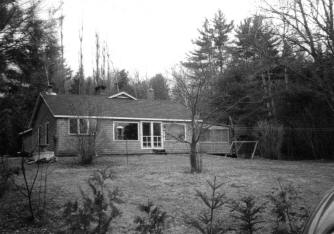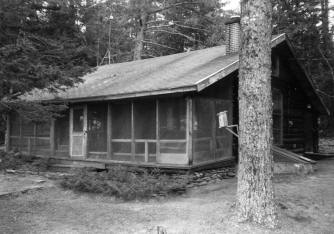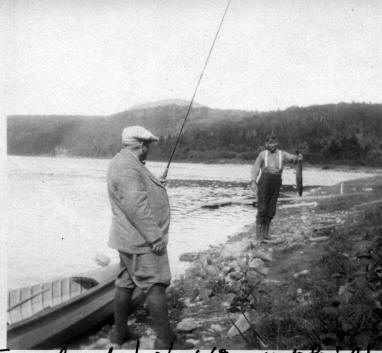

FISH HOUSE LANE
John
Dudley prepared this article for the August 2001 issue 110. It was
updated in 2010.
Fish House Lane is a short private
road that runs west from the north end of the Pokey Road, paralleling
Pocomoonshine Lake. Its name comes from Fred Harriman’s fish
house that was located off the road by the lake during the first
third of the twentieth century. Issue 96 had an article describing
Fred’s commercial fishing operations. A history of the Pokey
Road, ‘Tuf End’, will be found on this web site after it
is printed in a 2011 newsletter.


3 Fish House Lane
– Fred Harriman
bought this house site from Jasper Bailey in 1894. Within a few years
Fred built a house and moved to Alexander. Over time he acquired
almost all of lot 18. He had two reasons for moving here; he and
Frank Averill had planted pickerel in Pocomoonshine Lake and he
wanted to harvest a crop, and his brother-in-law had settled across
the Pokey Road. The pickerel flourished and Fred, starting in 1899 or
1900 caught fish, packed them in ice at his fish house at 19 Fish
House Lane, hauled them to the train station in Woodland to be
delivered at the market in Boston the next day. The ice came from
Pocomoonshine Lake and the box shooks from Sidney Cheney’s
mill.
Fred’s wife
Climemia died in 1909, Fred died in 1938. Their daughter Edith died
in 1940 and her husband Jim Crouse
lived at this site until he died in 1948. Edith’s daughter
Thelma (Smith) Hartford sold the place to William
and Viola Green of New York State. Bill had
the old house taken down and the present building erected. The house
was used summers by the Green family.
Richard and Jewell
Lundgren acquired the place. He was an
engineer at GP in Woodland. They used the place seasonally starting
in 1963 and also rented to game warden Gaynor Peary. Richard died in
1971 and the following year it was sold to Robert
and Frances Hillary of Maryland. They used it
seasonally.
Hillary sold it to Peter
and Karen Sears who lived here for a decade
with their three children, Jenny, Alicia and Timmy. Peter is a great
great-grandson of Fred Harriman. Peter and his family moved to a
bermed home on the Arm Road. In 1986 Vincent
and Patricia Gavin of Massachusetts bought
the place and used it as a summer home.
From 1997 until recently
this has been the year-round home of Greg and
Willow Owen and their children Julian and
Chelsea. Now it is used as a vacation home as the Owens live in South
Carolina.
15) Fish House Lane -
Muskrat Hut - Jason or Sumner
Hartford, husband of Thelma (Smith) Hartford
started building this camp about 1948. In 1960 their heirs sold it to
Bill Green who had the camp finished. It has been used by the Green
family ever since, first Bill’s grandson, Robert
Green who sold the camp to his cousin Cheryl
Green and she willed it to her son Ryan
Volpe
19 Fish House Lane – PokeShine - This
camp was built in 1910 for my grandfather, Herbert J. Dudley
of Calais. It was his moose hunting camp. He was one of those sports
from the city who also had a fishing camp on West Grand Lake, and a
deer hunting camp in Charlotte. This building passed to his son, John
M. Dudley who used it as a seasonal home until 1974 when he
retired here. After his death in 1988, it became the property of
third generation, Susan (Dudley) Strickland and John H. Dudley.
The property is now held by a family trust. The trust rents the camp
in the summer. The cellar for Fred Harriman’s fish house is
near PokeShine. It is interesting to note that all the logs in the
main camp are spruce that were cut near Pocomoonshine Mountain. They
had been yarded to the log-hauler road. Arthur Middlemiss from out
back of St. Stephen selected the logs from these huge piles, hauled
them on the ice across Pocomoonshine Lake on a set of sleds drawn by
a pair of horses and built the camp. That was in the winter of
1909-10. Charles Cousins and Jack (John M.) built the boathouse and
the new ice house in the mid 30s. In the early 1950’s, when
electricity came our way, indoor plumbing was installed, and the
icehouse was converted to a bunkhouse by Harold Cousins and Jack.


27 Fish House Lane
- There is a small cellar hole in the corner of a tiny garden plot
here. It has always been called Jasper
Bailey’s place. Orris Cousins asked me
if Austin Ash had once
lived here. I’ve never found evidence of that, nor found Ash
listed in Alexander records, however I’ve learned not to deny
such possibilities. About 50 years ago, I found a Civil War bayonet
in the garden after Harold Cousins had ploughed it. That sort of ties
the home site with the Bailey family. Jasper or his father, Civil War
veteran Isaiah Bailey, likely lived here between 1879 and 1890. He
also likely cleared the fields that later were used by
Stowell-MacGregor as sticking fields. Mel
Hunnewell (1891 – 1982) remembered the building.
31 Fish House Lane -
Pocomoonshine Lake Lodges - Men of wealth who
lived in the “city” and were interested in hunting and
fishing often built sporting camps. From the time of the Civil War,
the locations of these camps spread farther and farther from the
“city” as means of transportation improved. Steamships
and rail lines brought the “sports” to our area about the
turn of the century.
Louis
B. Adams of New York City arrived on the
shore of Pocomoonshine Lake in 1909. He acquired land from Fred
Harriman on August 5, and had a set of camps built. He later
acquired three more pieces of land from Harriman, in 1911, 1915, and
1919. He was a man with a dark complexion who had a heart problem,
and he owned those camps until his death. It is my understanding
that Charles and Lucretia Carlow of the Pokey Road named their ninth
child, Louis Adams Carlow (Dec. 5, 1914 - Jan. 3, 1992] after this
man, and that Lois Carlow and Juan Carlow also got their names from
the Adams family.
In the
spring of 1935, Robert L. Pond
of the Bronx, New York bought the set-up from Adam’s nephew
Richard Adams. Pond, a stockbroker, had spent time at Grand Lake
Stream hunting and fishing with Chester Yates as his guide. The
following paragraphs describe the camps between 1934 and 1948.
Herbie Fitzpatrick gave most of this information in January of 1996.

The camps consisted of four log buildings, three
with frame additions. A frame boathouse was near the shore. A
framed cook's house with sheds and the old garage were near the main
lodge. Later a "new garage" was built by Charles Cousins on
the way into the camp yard. A water tower stood near the old garage
and a set of doghouses completed the buildings.
The main
lodge had a kitchen where the cook prepared all the food. During
Pond's years, that cook was Katherine Beaton.
Katherine was from Mabou Mines, Cape Breton Island, Nova Scotia, and
worked year round for the Ponds. Unlike most homes in Alexander at
that time, the kitchen had running water. Refrigeration was in the
form of a cylindrical aluminum icebox that stood in the entryway.
The ice came from Pocomoonshine Lake and Charles Cousins was the man
who supplied it.
The main lodge also had
a large dining/living room and a glassed-in porch.
West of the main lodge
were the other three log buildings. The first two were identical,
each with a porch, a large sitting room, a small bedroom, and a
bathroom with running water. The first was the Ponds’ camp. The
second was their guest camp The last log building had only the porch
and a living room with a large stone fireplace. Yes, it was the
living room.
The cook's house or
guide's camp was in two parts. Katherine had her room, and Herbie
had his.
Herbie
Fitzpatrick went to work in the fall of 1934
for Louis Adams. Herbie's Uncle Zealie Smith had worked for Adams
for many years. Zealie had bought Duck Lake Camps, so he got his
nephew to take over his old job, and gave him some training.
Each
spring Herbie had to open the camps, the battens had to be removed
from the windows and doors, the boats and canoes pulled out of the
boat house and prepared for the season, the water and electrical
systems activated. The water system was a gasoline-powered pump with
a big flywheel that moved the lake water to the tower. From the
tower the water ran by gravity to the camps. The electric system was
32-volt direct current. All along
one wall of the old garage were large storage batteries. A gasoline
powered “Delco” generator was cranked up once a day to
charge the batteries. The batteries powered lights in the camps.
When the Ponds were at
camp, Herbie started his day by putting on a fire in each occupied
camp, and in the kitchen. He took care of all the details such as
filling wood boxes and helping Katherine with cooking and laundry.
He was the chauffeur whenever the car went to town, and was Mr.
Pond's guide whenever he went fishing or hunting. He would paddle
the canoe, or run the big boat which had a four cylinder marine
engine. Whenever he was out with Mr. Pond, Herbie carried a pocket
full of cookies for Pond was a diabetic.
Robert Pond was a
gentleman and a serious upland bird hunter. Pliney Frost remembers
him as the only one to ask permission to hunt on the Frost farm at
the foot of Lanes Hill. Pond had a number of hunting dogs, including
one that cost $500. The dogs spent the winter at St. Stephen with
Charles "Chic" Middlemiss. Charles was a brother of Arthur,
the builder of PokeShine.
The fishing was good in
those days. Five-pound pickerel were common and the white perch were
enormous. This was still in the time of Fred Harriman and the
commercial fishing on the lake. Herbie never caught a trout, but
there were eels to no end. One day he took a Mr. Davis fishing.
Davis, a friend of Pond's, was the president of the American
Locomotive Company and not much of a fisherman. Out around the first
point, Davis hooked onto a large fish. He never set the hook, he
yelled at Herbie to "Watch the boat!" (they were in a
canoe), but dragged the fish in close enough for Herbie to net. It
was a small mouth bass that weighed about five pounds and was the
first Herbie had seen taken out of Pocomoonshine Lake.
One of the interesting
things in the main lodge was a stuffed "Arctic" or snowy
owl. Arthur Harriman had shot the owl down river and Mr. Pond had
had it stuffed.
Other people who were
at the camp included Mr. Pond's aunt, Mrs. Hibbet, Mrs. Pond's niece
Miss Tewksbury and their friends Mr. and Mrs. Burns of New York.
Harley Andrews helped at times with jobs, and Cecil Hatfield repaired
the Delco and boat engines when needed.
Herbie and Ethel Fitzpatrick were long time
residents of Baring. They last lived at Sun Rise Apartments in
Calais. They were members of the Alexander Grange. Thanks Herbie!
On October 8, 1949, Eldon P. and Bea
Embleton of Harvey, New Brunswick acquired the property of Robert L.
Pond from his widow. The Embletons made several changes to the
buildings to create a public sporting camp.
The new garage was converted into a two-unit
rental and the former guides and cooks camp was made into one rental.
The three log camps along the lakeshore became units 4 – 6 and
were unchanged except for a bathroom being added to unit 6.
Commercial electric power was
available from Dennys River Electric Coop so the old 32-volt
generator and batteries were abandoned. Also an electric water pump
was easier to maintain than the old gas pump, so the old water tower
was taken down.
In May 1953, Eugene
Moriarty and Egbert “Bert” Inman
brought the property and business from Embleton. In June of the
following year, the Moriartys became sole owners of the Lodges.


Gene and Estelle
Moriarty made one major change over the years
in the operation of the camps. They had purchased a Continental Plan
business where all meals were prepared by the owners and served on
the enclosed porch of the main lodge or taken up lake as picnics by
the sports. They changed this to American Plan where each unit had a
kitchen and no meals were provided by the owners. The two units in
the new garage became one unit with one of the rooms becoming a
kitchen. Kitchen areas were built into the other units as well.
Later the Moriartys built a
two-bedroom addition onto the main lodge making it a comfortable
home. They turned number 3 camp by 90 degrees so that it faced the
lake, and moved the sheds back beside the old garage. Gene and
Estelle spent 35 seasons at the lodges. When they started, they had
to drive to Charlie Brown’s store to use the telephone.
In June 1988 Jeff Wright purchased the lodges and he continued to run them as a public sporting camp for about a decade. Today, Jeff rents only occasionally.